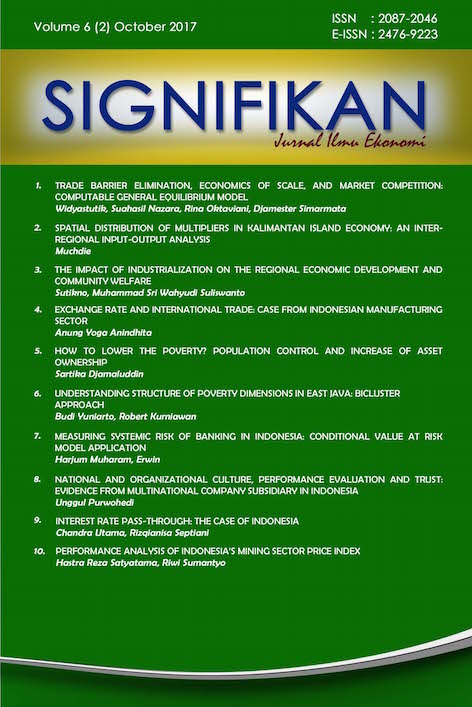National and Organizational Culture, Performance Evaluation and Trust: Evidence from Multinational Company Subsidiary in Indonesia
DOI:
https://doi.org/10.15408/sjie.v6i2.4733Keywords:
national culture, organizational culture, performance evaluation, trustAbstract
The aim of this study is to investigate the impact of national and organizational culture on the relationship between accounting and trust in a subsidiary of a Western Multi-National Company (MNC) in Indonesia. This study use a qualitative field study of one French MNC subsidiary and interview four expatriate directors, nine Indonesian managers and 10 Indonesian employees. Key themes were identified with the assistance of NVivo software. In this study, accounting, through formal performance evaluation, contributes to trust building between supervisors and their subordinates. Formal performance evaluation through transparent and objective evaluation increases trust in the supervisor. On the other hand, informal performance evaluation tends to decrease trustful behaviour due to secrecy in the evaluation process. It appears that Indonesian national culture does influence organizational culture preference in the local staff. Individuals share national culture as a result of values developed from family, religion, education, and experience.
References
Bhimani, A. (1999). Mapping Methodological Frontiers in Cross-National Management Control Research. Accounting, Organizations and Society. 24(5-6): 413-440.
Buckley, P. J., & M.C. Casson. (2009). The Internalisation Theory of The Multinational Enterprise: A Review of the Progress of a Research Agenda After 30 years. Journal of International Business Studies. 40 (9): 1563-1580.
Busco, C., A. Riccaboni, and R.W. Scapens. (2006). Trust for Accounting and Accounting for Trust. Management Accounting Research. 17(1): 11-41.
Busco, C., E. Giovannoni, & R.W. Scapens. (2008). Managing the Tensions in Integrating Global Organizations: The Role of Performance Management Systems. Management Accounting Research. 19(2): 103-125.
Carmona, S., M. Ezzamel, & F. Gutierreez. (2002). The Relationships Between Accounting and Spatial Practices in The Factory. Accounting, Organizations and Society. 27(3): 239-274.
Chow, C. W., M.D. Shields, & A. Wu. (1999). The Importance of National Culture in The Design of and Preference for Management Controls for Multi-national Operations. Accounting, Organizations and Society. 24 (5-6): 441-461.
Chow, C. W., G.L. Harrison., J.L. McKinnon., & A. Wu. (2002). The Organizational Culture of Public Accounting Firms: Evidence from Taiwanese Local and US Affiliated Firms. Accounting, Organizations and Society. 27(4-5): 347-360.
Dossi, A. & L. Patelli. (2008). The Decision-influencing Use of Performance Measurement Systems in Relationships Between Headquarters and Subsidiaries. Management Accounting Research. 19(2): 126-148.
Efferin, S., & T. Hopper. (2007). Management Control, Culture and Ethnicity in a Chinese Indonesian Company. Accounting, Organizations and Society. 32(3): 223-262.
Evans, L. (2004). Language, Translation and The Problem of International Accounting Communication. Accounting, Auditing, and Accountability Journal. 17(2): 210-248.
Flick, U. (2006). An Introduction to Qualitative Research. London: Sage Publications.
Giddens, A. (1991). The Consequences of Modernity. California: Stanford University Press.
Harrison, G. L., & J.L. Mckinnon. (1998). Editorial: Culture and Management Accounting. Management Accounting Research. 9: 113-118.
Hartmann, F., & S. Slapnicar. (2009). How Formal Performance Evaluation Affects Trust Between Superior and Subordinate Managers. Accounting, Organizations and Society. 34(6-7): 722-737.
Hofstede, G. (1998). Attitudes, Values and Organizational Culture: Disentangling the Concepts. Organization Studies. 19(3): 477-493.
Hofstede, G., & M.F. Peterson. (2000). National Values and Organizational Practices. In N. M. Ashkanasy, C. P. M. Wilderom & M. F. Peterson (Eds.), Handbook of Organizational Culture and Climate. London: Sage Publications.
Hofstede, G. (2001). Culture's Consequences: Comparing Values, Behaviors, Institutions, and Organizations Across Nations. London: Sage Publications.
Iriyadi, & B. Gurd. (1998). Cultural Effects of Budgetary Participation: Indonesian Evidence. Asian Review of Accounting. 6(2): 71-100.
Jones, T. C., & D. Dugdale. (2001). The Concept of Accounting Regime. Critical Perspectives on Accounting. 12(1): 35-63.
Keles, S., & Z. Aycan. (2011). The Relationship of Managerial Values and Assumptions with Performance Management in Turkey: Understanding Within Culture Variability. The International Journal of Human Resource Management. 22(15): 3080-3096.
Leung, K., R.S. Bhagat., N.R. Buchan., M. Erez., & C.B. Gibson. (2005). Culture and international business: recent advances and their implications for future research. Journal of International Business Studies. 36(4): 357-378.
Levy, O., S. Beechler., S. Taylor., & N.A. Boyacigiller. (2007). What We Talk About When We Talk About 'Global Mindset': Managerial Cognition in Multinational Corporations. Journal of International Business Studies. 38(2): 231-258.
Moilannen, S. (2008). The role of accounting and intermediate subsidiary in the management control system. Management Accounting Research. 19(3): 252-269.
O'Donnell, E., & J. Prather-Kinsey. (2010). Nationality and Differences in Auditor Risk Assessment: A Research Note with Experimental Evidence. Accounting, Organizations and Society. 35: 558-564.
Siti-Nabiha, A. K., & R.W. Scapens. (2005). Stability and Change: an Intitutionalist Study of Management Accounting Change. Accounting, Auditing, and Accountability Journal. 18(1): 44-73.
Suutari, V., K. Raharjo., & T. Riikkila. (2001). The Challenge of Cross Cultural Leadership Interaction: Finnish expatriates in Indonesia. Career Development International. 7(7): 415-429.
Vosselman, E., & J.V.D. Meer-Kooistra. (2009). Accounting for Control and Trust Building in Interfirm Transactional Relationships. Accounting, Organizations and Society. 34(2): 267-283.

